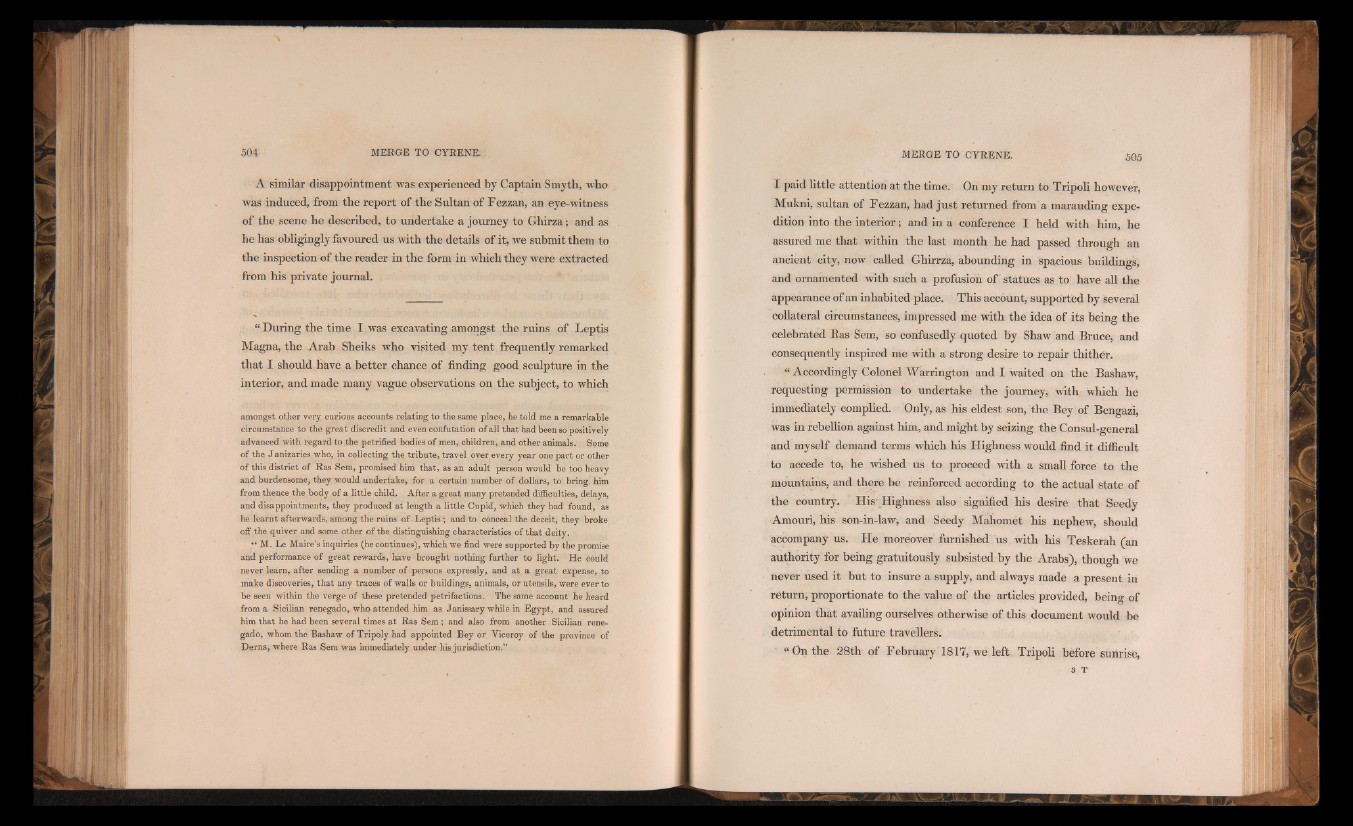
A similar disappointment was experienced by Captain Smyth, who
was induced, from the report of the Sultan of Fezzan, an eye-witness
of the scene he described, to undertake a journey to Ghirza; and as
he has obligingly favoured us with the details of it, we submit them to
the inspection of the reader in the form in which they were extracted
from his private journal.
“During the time I was excavating amongst the ruins of Leptis
Magna, the Arab Sheiks who visited my tent frequently remarked
that I should have a better chance of finding good sculpture in the
interior, and made many vague observations on the subject, to which
amongst otlier very, curious accounts relating to the same place, he told me a remarkable
circumstance to the great discredit and even confutation of all that had been so positively
advanced with regard to the petrified bodies of men, children, and other animals.: Some
of the Janizaries who, in collecting the tribute, travel over every year one part or other
of this district of Ras Sem, promised him that, as an adult person would be too heavy
and burdensome, they would undertake, for a certain number of dollars, to bring him
from thence the body of a.little child. After a great many pretended difficulties, delays,
and disappointments, they produced at length a little Cupid, which they had found, as
he learnt afterwards, among the ruins of Leptis ; and to conceal the deceit, they broke
off the quiver and some other of the distinguishing characteristics of that deity.
“ M. Le Maire’s inquiries (he continues), which we find were supported by the promise
and performance of great rewards, have brought nothing further to light. He could
never learn, after sending a number of persons expressly, and at a great expense, to
make discoveries, that any traces of walls or buildings, animals, or utensils, were ever to
be seen within the verge of these pretended petrifactions. The same account he heard
from a Sicilian renegado, who attended him as Janissary while in Egypt, and assured
him that he had been several times at Ras Sem ; and also from another Sicilian renegado,
whom the Bashaw of Tripoly had appointed Bey or Viceroy of the province of
Derna, where Ras Sem was immediately under his jurisdiction.”
I paid little attention at the time. On my return to Tripoli however,
Mukni, sultan of Fezzan, had just returned from a marauding expedition
into the interior; and in a conference I held with him, he
assured me that within the last month he had passed through an
ancient city, now called Ghirrza, abounding in spacious buildings,
and ornamented with such a profusion of' statues as to have all the
appearance of an inhabited place. This account, supported by several
collateral circumstances, impressed me with the idea of its being the
celebrated Eas Sem, so confusedly quoted by Shaw and Bruce, and
consequently inspired me with a strong desire to repair thither.
“ Accordingly Colonel Warrington and I waited on the Bashaw,
requesting permission to undertake the journey, with which he
immediately complied. Only, as his eldest son, the Bey of Bengazi,
was in rebellion against him, and might by seizing the Consul-general
and myself demand terms which his Highness would find it difficult
to accede to, he wished us to proceed with a small force to the
mountains, and.there be reinforced according to the actual state of
the country. His- Highness also signified his desire that Seedy
Amouri, his son-in-law, and Seedy Mahomet his nephew, should
accompany us. He moreover furnished us with his Teskerah (an
authority for being gratuitously subsisted by the Arabs), though we
never used it but to insure a supply, and always made a present in
return, proportionate to the value of the articles provided, being of
opinion that availing ourselves otherwise of this document would be
detrimental to future travellers.
“ On the 28th of February 1817, we left Tripoli before sunrise,